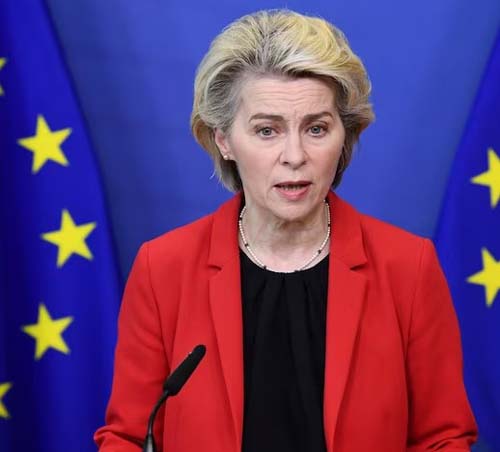
Georgia recommended for EU membership candidate status
Newswire
Brussels: After much suspense and speculation, Europe’s doors opened slightly wider for Georgia on November 8 when the European Union laid out its plan for making itself a bigger place in the future.
Georgia was recommended for membership candidate status – a move that many hope will help sharpen the nation’s blurred focus on EU integration and democracy-building.
“First of all, this is a truly remarkable day for Georgia,” said Ursula von der Leyen, the President of the European Commission on November 8, said as she fielded questions after presenting a broad outline for the bloc’s potential enlargement.

“This is a really huge step for Georgia, and it also emphasizes the impressive and very unequivocal position of the majority of the population of Georgia to become members of the EU,” said the head of the EU’s executive arm.
Although Georgia was a bit of a sideshow at the announcement where Ukraine was the primary focus, the Commission’s recommendation is indeed of huge consequence for a country where EU membership is seen as a solution to many economic, democratic and security woes.
EU member states are yet to sign off on the recommendation – that decision will come in December – but the mood is already celebratory in Georgia. “It’s a great honor for me to congratulate you all on this historic decision,” said Georgian Prime Minister Irakli Garibashvili. “This is, of course, a historic day for Georgia.”
Georgia’s rivaling political figures and groups – the prime minister, president, the ruling party, the opposition and civil society – all claimed the credit for the accomplishment, indicating that this historic day is not going to fix the nation’s fierce domestic divisions, which Brussels in fact sees as an obstacle on Georgia’s path toward European integration.
For all the celebrations, Georgia still remains behind Ukraine and Moldova in the European waiting room. In its recommendation for enlargement, the European Commission proposed opening accession talks with the two fellow ex-Soviet nations, while Georgia was recommended for the membership status – a signpost Ukraine and Moldova passed last year.
Georgia was declined the status then, even though the three nations were previously bundled together as prospective members. The Georgian government’s decision to take a cautious stance toward Russia and even allow economic rapprochement with Moscow in the middle of Russia’s war on Ukraine were widely blamed for the flop.
In its recommendation, the European Commission noted that Georgia is at odds with the European Union’s common policy of economic isolation of Russia over Ukraine. The European Commission specifically said that Georgia needs to align itself with the trajectory of the EU’s external relations to make progress toward membership.
Apart from the issues with foreign policy, the ruling Georgian Dream party has also been engaged in Euroskeptic rhetoric, spreading conspiracy theories involving the EU and U.S. and earlier this year it tried to pass a highly controversial law which European diplomats said was incompatible with EU norms and practices. All of this spurred accusations of Georgian Dream deliberately sabotaging the country’s bid for EU membership and driving the nation into Moscow’s embrace.
The domestic situation in Georgia made the decision a difficult needle for the EU to thread: granting candidate status could be seen as rewarding Georgian Dream for its slide into illiberalism while denying it could demoralize Georgian society and perhaps sour it on the whole Euro-integration project.
EU member Hungary, which itself has been drifting away from democracy for a decade or so, might have been lobbying for Georgia’s bid within the union, according to RFE/RL’s Richard Jozwiak.
“Budapest may try to bargain, only approving Kyiv’s bid if other countries sign off on Georgia – which has developed strong ties with Hungary – getting candidate status,” Jozwiak wrote on November 6.
The Hungarian and Georgian governments have indeed buddied up to each other over their shared vision of Europe that foregrounds not liberalism and democracy but Christianity and “traditional values.”
In any case, today Georgian Dream felt vindicated, saying that it has worked hard to meet EU-set requirements to qualify for the candidate status. Georgian Dream detractors say that credit for the success belongs to the Georgian people, as large crowds came out into the streets of Tbilisi when Georgian society felt that its European future and democratic freedoms were under threat.
The European Commission today used diplomatic language, underscoring the role of the Georgian people, but also commending the Georgian government for recent progress toward meeting some of the democratization goals set by the EU. The remaining problematic areas include the rule of law, fair elections and independence of the judiciary.
EU ambassador to Georgia, Pawel Herczynski, emphasized that the candidate status comes with conditions. “Addressing these steps will be crucial to move to the next stage,” Herczynski said. “This is the nature of the enlargement process: constant reform so the country can be ready to take its place as a full member of the European Union.”
Some critics of the Georgian government are worried that Georgian Dream can still botch the progress toward membership if it decides that the EU-prescribed reforms – better elections and a more inclusive political process – amount to a threat to the party’s hold on power or if Moscow steps up pressure on Georgia. But, overall, optimism and celebratory mood is prevailing today, and worries are left for tomorrow.
Late in the evening, President Salome Zourabichvili hosted in front of her residence a large gathering attended by foreign diplomats and dignitaries. Congratulating the crowd, she said, “this is our response to Russia and to Russian occupation.”
